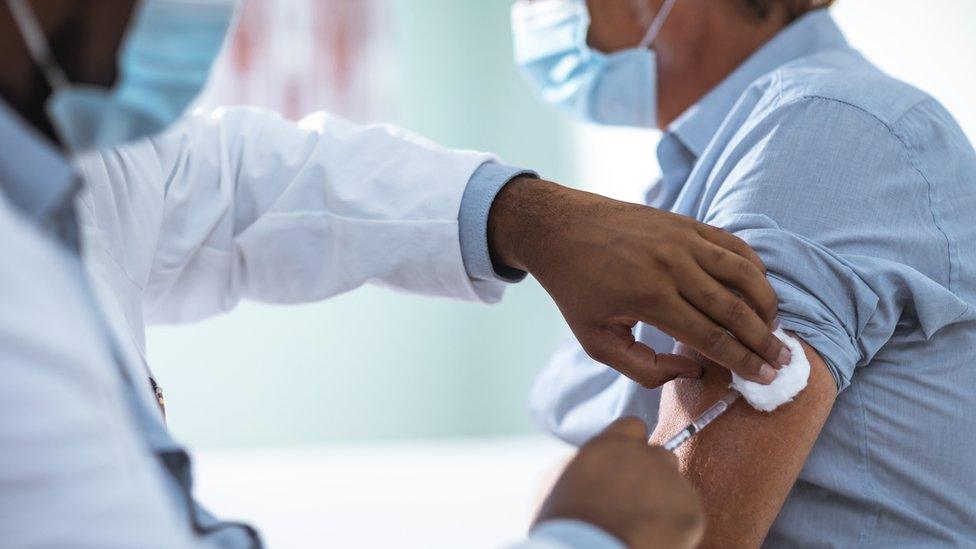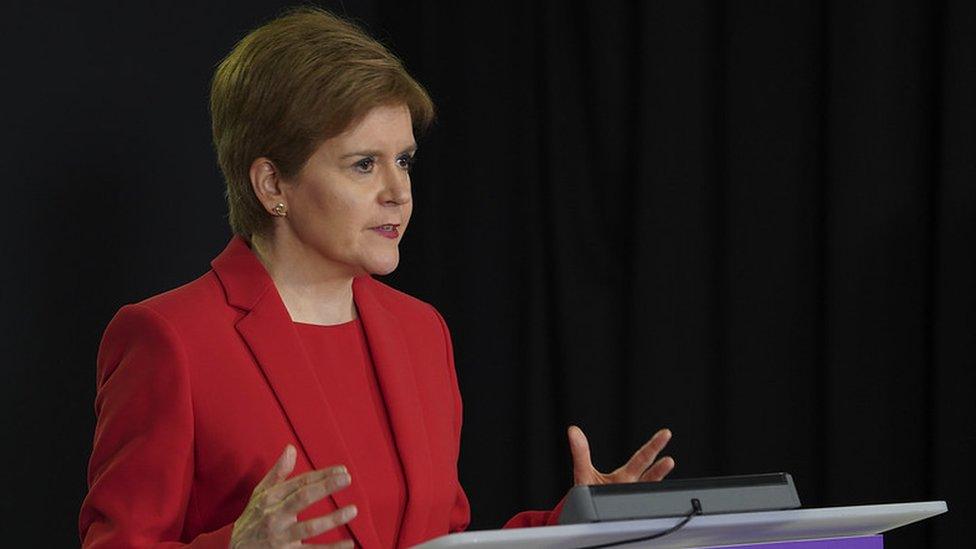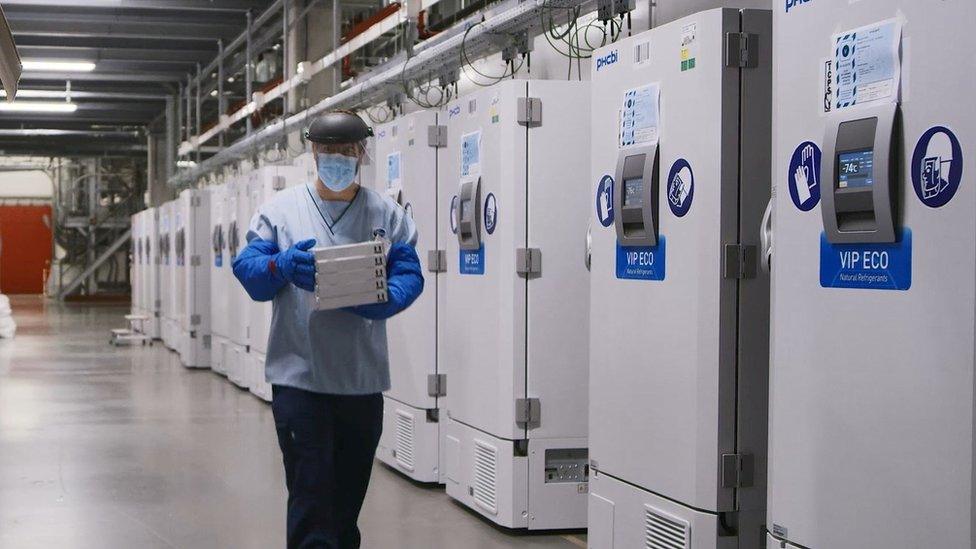Covid in Scotland: First vaccinations to start next week
- Published
- comments

Supplies of the vaccine are expected in the coming days
People in Scotland will start to receive a Covid-19 vaccine from next week, Nicola Sturgeon has said.
The UK has become the first country in the world to approve the Pfizer-BioNTech vaccine as being safe for use.
The first minister said it was expected the first jabs could be administered in Scotland on Tuesday 8 December.
She said this was "without a shadow of a doubt the best news we have heard since the pandemic started".
Ms Sturgeon warned that "we are not at the end of this pandemic yet" and added that the vaccination programme would be a massive logistical exercise.
But she added: "Today does feel like it may well be the beginning of the end of this horrible experience".
The Medicines and Healthcare Products Regulatory Agency (MHRA) has said the vaccine - which offers up to 95% protection against Covid-19 illness - is safe to roll out, and immunisations for people in priority groups could start within days.
The UK government has already ordered 40 million doses - enough to vaccinate 20 million people, with two shots each.
About 800,000 doses of the vaccine are expected to be available in the UK next week, with a share being made available for Scotland.
Ms Sturgeon said this was "fantastic news", and that there was a "high probability" that people could start receiving the first of two required doses in the next week.
She said: "If we receive the first doses as soon as we are expecting to, I can confirm the first vaccines will be administered on Tuesday, 8 December. That is just six days from now."

Nicola Sturgeon said the approval of the vaccine was "fantastic news"
Ms Sturgeon said rolling out the vaccine across the country would be a "massive operation", and said people "must not ease up in our effort to control" the virus in the meantime.
She added: "For all the difficulties that lie ahead, this should give us real hope that the end of this pandemic is in sight."
Ms Sturgeon said she would be getting vaccinated as soon as she could - and would be prepared to get the jab live on TV if it encouraged others to get it.
The vaccination will not be mandatory and the first minister stressed that the government was "not planning sanctions" for those who decide not to get it.
But she added: "We will put everything we've got behind persuading everybody to get this vaccine as soon as they become eligible."
The UK government's Scottish secretary, Alister Jack, said British Army planners have already been working with the Scottish government and a number of health boards to provide strategic planning expertise to help ensure people in Scotland get the vaccine as quickly as possible.
It is thought that big venues such as the Edinburgh International Conference Centre are being lined up as the type of venue that will be transformed into vaccine distribution "hubs" once the second phase is rolled out for the wider population.
National clinical director Prof Jason Leitch told BBC Scotland's Drivetime with John Beattie: "We will need high-volume places to get through people, a bit like we've done with testing, and that might well end up being in airports, football stadia, community centres all over the country."
The vaccine doses will be rolled out as quickly as the company in Belgium can make it, UK Health Secretary Matt Hancock said, with the first load next week and then "several millions" throughout December.
But the bulk of the rollout will be next year, he added, while predicting: "2020 has been just awful and 2021 is going to be better.
"I'm confident now, with the news today, that from spring, from Easter onwards, things are going to be better. And we're going to have a summer next year that everybody can enjoy."
'Reclaim our lives'
Prime Minister Boris Johnson added: "It's the protection of vaccines that will ultimately allow us to reclaim our lives and get the economy moving again."
Scottish Labour MSP Iain Gray welcomed the vaccine announcement as "the day we have all been waiting for".
But he said the Scottish government's recent track record on logistics has "not been so good", citing problems with delivery of PPE and expanding the testing programme.
The Scottish Conservatives criticised the first minister for making the announcement in her daily briefing, rather than in the Scottish Parliament, and for not publishing the government's vaccine delivery plan.
The party's leader at Holyrood, Ruth Davidson, said: "The public needs to hear answers from the first minister and the plans have to be scrutinised fully by parliament to avoid any pitfalls, such as the postcode lottery that occurred with the flu jab rollout this year."
Who will be vaccinated first?

The vaccine is made in Belgium and has to be stored at around -70C
Everyone in Scotland over the age of 18 will be offered a vaccination - that's 4.4m people.
The UK's Joint Committee on Vaccination and Immunisation (JCVI) has drawn up advice on how people should be prioritised.
It has said that the priorities for the first wave of vaccine distribution, from December to February, are:
frontline health and social care staff
older residents in care homes
care home staff
all those aged 80 and over
unpaid carers and personal assistants
those delivering the vaccination programme
What is the vaccine?

It is a new type called an mRNA vaccine that uses a tiny fragment of genetic code from the pandemic virus to teach the body how to fight Covid-19 and build immunity.
An mRNA vaccine has never been approved for use in humans before, although people have received them in clinical trials.
The vaccine must be stored at around -70C and will be transported in special boxes, packed in dry ice. Once delivered, it can be kept for up to five days in a fridge.
The vaccine was 95% effective for all groups in the trials, including elderly people.
The head of the MHRA, Dr June Raine, said despite the speed of approval, no corners have been cut.
Batches of the vaccine will be tested in labs "so that every single vaccine that goes out meets the same high standards of safety", she said.
Another vaccine from Moderna uses the same mRNA approach as the Pfizer vaccine and offers similar protection. The UK has pre-ordered seven million doses that could be ready by the spring.
The UK has ordered 100 million doses of a different type of Covid vaccine from Oxford University and AstraZeneca. That vaccine uses a harmless virus, altered to look a lot more like the virus that causes Covid-19.
Russia has been using another vaccine, called Sputnik, and the Chinese military has approved another one made by CanSino Biologics. Both work in a similar way to the Oxford vaccine. There are some other promising vaccines that could also be approved soon.


Use the form below to send us your questions and we could be in touch.
In some cases your question will be published, displaying your name, age and location as you provide it, unless you state otherwise. Your contact details will never be published. Please ensure you have read the terms and conditions.
If you are reading this page on the BBC News app, you will need to visit the mobile version of the BBC website to submit your question on this topic.